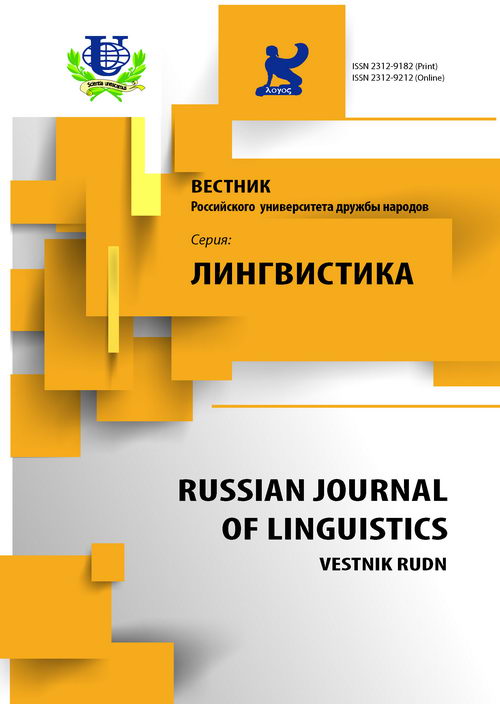No 1 (2008)
- Year: 2008
- Articles: 18
- URL: https://journals.rudn.ru/linguistics/issue/view/592
Articles
 5-13
5-13


Evolution of colour desination semantics according to the law of expansion of semtic volume of word
Abstract
The article is devoted to judgement of historical development of colour's names according to the law of expansion of semantic volume of a word. A basis of the concept of historical development of colour designation is made up of regulations about subject significance which forms the standard of colours designation, about ability of an eye to distinguish concrete colour and about a degree of complexity of nomination processes. The research is done on a material of Indo-European languages.
Russian Journal of Linguistics. 2008;(1):14-21
 14-21
14-21


Interrelations between borrowings and language interference
Abstract
This article is devoted to the problem of interrelations between borrowings and language interference as a result of language contact. The conducted analyses showed that the phenomenon under study has both a number of common and specific features. It also allowed to compare the views of foreign and Russian scientists on the problem.
Russian Journal of Linguistics. 2008;(1):22-27
 22-27
22-27


Binary, repeating, multiplaced...
Abstract
The article considers some problems of structure of Russian conjunctions. The author believes that the structure should be described with reference to the available classifications. It is based on the observable and pointed properties of concept and terminology systems of the classifications.
Russian Journal of Linguistics. 2008;(1):28-35
 28-35
28-35


School and family nicknames used by teenagers (based on german and russian languages)
Abstract
The article is devoted to analysis of nicknames used by modern teenagers. Nicknames used at school or between the family members are given special attention. The article contains detailed classification of nicknames and a vast number of real life examples.
Russian Journal of Linguistics. 2008;(1):36-43
 36-43
36-43


 44-50
44-50


Set speech formulas of address as the reflection of social and hierarchy relations of communicators in Arab society
Abstract
Speech, depending upon communication situation, is not invariable. Arabians, when addressing to high rank persons and to each other apply accepted speech patterns differed by regions. In comparison with the Russian language the Arabian ASP shall obligatory consider gender components, for instanse, when applying names of posts, specialites and etc., which in many languages, including Russian, are applied in macculine gender only, namely: chairman, director, engineer, inspector, president, teacher and etc. ASP reflex social hierarchical relations, accepted in the life-style of every Arabian country. We deem that tasks of this analysis is firstly finding features of ASP and their description, and secondly, - review of features of their application depending on social differentiation of the modern Arabian language, which will allow to receive results, which will promote better mastering ASP and their application in public-speech practise by future language experts.
Russian Journal of Linguistics. 2008;(1):51-59
 51-59
51-59


Text forming function of socio-publicistic text title in the modern arabic and russian languages
Abstract
The article deals with the problem of modern newspaper title and it's role in the socio-political arabic and russian texts. There are different types of titles that are used in arabic and russian publicistic texts (for example, nominative, informative, intertextual etc.), but any of it has it's own specific functions. Despite of the fact that each of it is closely connected to the main part of text, for some of them title mostly plays a stylistic and expressive role, for others title makes up the bulk of the text semantic and structure frame.
Russian Journal of Linguistics. 2008;(1):60-65
 60-65
60-65


Shaping karachaevo-balkar names
Abstract
In work is executed analysis of the formation karachaevo-balkar names, is offered grammatical structure of the shaping karachaevo-balkar names, is shown that shaping the names at time covers the enormous gap of time and formed by comprehensions karachaevo-balkar and their ancestors object and phenomenas material and spiritual world and transformations them in of the antroponims.
Russian Journal of Linguistics. 2008;(1):66-74
 66-74
66-74


 75-82
75-82


 83-87
83-87


 88-93
88-93


Homo admirans «a surprising person» in phraseological space of the french language
Abstract
The article deals with the problems of the expression of the emotional state «Astonishment» in the French phraseology.
A complete analysis of the phraseological means of the expression of the astonishment requires taking into account the semantic peculiarities of the linguistic category «the state» and the national features of the French language.
Russian Journal of Linguistics. 2008;(1):94-101
 94-101
94-101


 102-105
102-105


 106-108
106-108


Stylistics of the Russian language as a study discipline at a non-linguistic university
Abstract
The article highlights basic aspects of Russian stylistics as an integral part of linguistic training of university students of non-linguistic specialties. It also underlines the significance of this academic discipline, its role and place in the system of communicative and professional demands of future specialists in the field of service.
Russian Journal of Linguistics. 2008;(1):109-112
 109-112
109-112


Model of functioning of russian conjunctions in the cognition
Abstract
This article deals with the conjunctions regarded as subsigns. Firstly, the conjunctions indicate that there is a relativity meaning in the frame. Secondly, the conjunctions emphasize the relations occurred in the context .
In order to express the idea the speaker has to form a complicated structure of statement by reflecting various aspects of relations to the surface language structure.
Russian Journal of Linguistics. 2008;(1):113-119
 113-119
113-119


Nashi avtory
Russian Journal of Linguistics. 2008;(1):120-121
 120-121
120-121
















